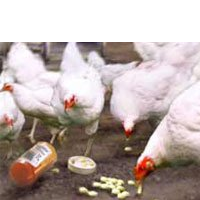California Livestock Antibiotics Bill Dies Without Even a Committee Vote

It is not unusual for California to lead the way on environmental and health issues by passing legislation that pressures the federal government and other states to follow its lead. That will not be the case in this state legislative session on at least one issue.
Assemblyman Kevin Mullin (D-South San Francisco) withdrew his bill that would have prevented poultry or livestock products from being sold in California if the animals had been “administered a medically important antimicrobial for non-therapeutic use, such as growth promotion, feed efficiency, weight gain, or disease prevention.”
In other words, the state won't do anything for now about BigAg pumping up, and plumping up, animals with antibiotics for financial gain regardless of medical need or the threat to the humans who eat their products. Antibiotics could only have been used to treat already-sick animals.
Mullin said his bill lacked the necessary votes to pass its first hurdle in the Assembly's Agriculture Committee. Legislation coming out of the Senate, described by the Sacramento Bee as a "less far-reaching bill" that relied more on voluntary constraints was approved by the state Senate on Thursday.
The federal Centers for Disease Control and Prevention (CDC) estimates that more than 2 million people are sickened every year in the United States with antibiotic-resistant infections. At least 23,000 die as a result. This is not a new problem.
It wasn't new in 2008 when a Johns Hopkins report (pdf) warned that the nation needed to curtail its use of antibiotics in animal feed. As much as 80% of the antibiotics sold in the U.S. are fed to cattle, pigs, chickens and other farm animals, according to the U.S. Food and Drug Administration (FDA). That reduces the efficacy of the drugs when it comes to fighting deadly infections in people.
Dr. Gail Hansen, a veterinarian and senior officer for the Pew Campaign on Human Health and Industrial Farming, put it most succinctly:
“We feed antibiotics to sick animals, which is completely appropriate, but we also put antibiotics in their feed and in their water to help them grow faster and to compensate for unhygienic conditions. If you have to keep the animals healthy with drugs, I would argue you need to re-examine the system. You don't take antibiotics preventively when you go out into the world.”
The FDA knows that “antibiotics are added to the animal feed or drinking water of cattle, hogs, poultry and other food-producing animals to help them gain weight faster or use less food to gain weight.” That's why, last December, it said, “Because all uses of antimicrobial drugs, in both humans and animals, contribute to the development of antimicrobial resistance, it is important to use these drugs only when medically necessary.”
It made the statement when it encouraged animal pharmaceutical companies to voluntarily comply with suggestions the agency made for implementing a policy over a three-year period “to phase out production use of medically important antimicrobial products and to bring the remaining therapeutic uses under the oversight of a veterinarian.” The FDA said antibiotics should only be used at the direction of veterinarians.
Why voluntary and not mandatory? “Because it is the fastest, most efficient way to make these changes,” according to William Flynn, deputy director for science policy at the FDA’s Center for Veterinary Medicine (CVM). “Based on our outreach, we have every reason to believe that animal pharmaceutical companies will support us in this effort,” FDA deputy commissioner for foods and veterinary medicine Michael R. Taylor said.
Don't expect to see any reductions in antibiotic-resistant infections anytime soon.
–Ken Broder
To Learn More:
California Livestock Antibiotics Bill Shelved (by Jeremy B. White, Sacramento Bee)
Ban Sought on Animal Antibiotics as Human Resistance Grows (by Stacy Finz, San Francisco Chronicle)
Antibiotic Resistance ThreatsIn the United States, 2013 (Centers for Disease Control and Prevention) (pdf)
U.S. Uses 40 Tons of Antibiotics a Day Just to Grow Food (by Noel Brinkerhoff, AllGov)
Failure to Curb Use of Antibiotics in Livestock Signals Danger for Humans (by Noel Brinkerhoff, AllGov)
- Top Stories
- Controversies
- Where is the Money Going?
- California and the Nation
- Appointments and Resignations
- Unusual News
- Latest News
- California Forbids U.S. Immigration Agents from Pretending to be Police
- California Lawmakers Urged to Strip “Self-Dealing” Tax Board of Its Duties
- Big Oil’s Grip on California
- Santa Cruz Police See Homeland Security Betrayal in Use of Gang Roundup as Cover for Immigration Raid
- Oil Companies Face Deadline to Stop Polluting California Groundwater





